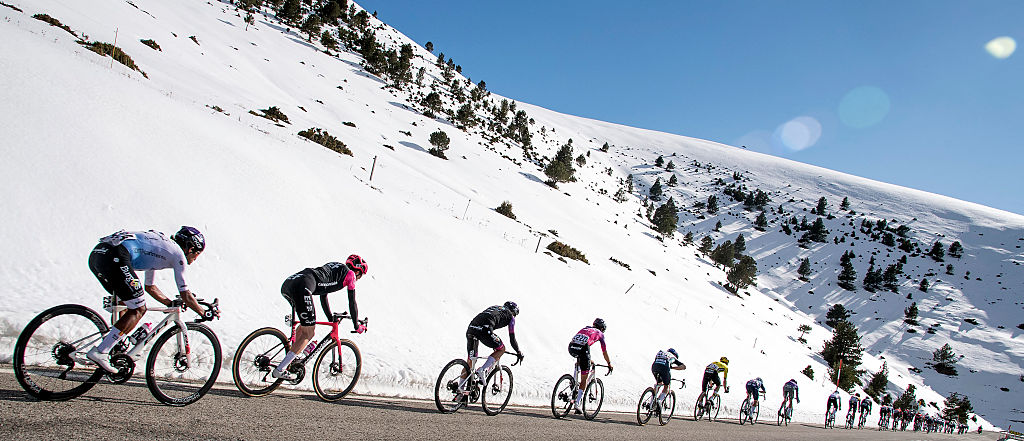Volta a Catalunya celebrates summit finish on 'cycling landmark' Montserrat for first time in 30 years
Peloton faces second category 1 summit finish in as many days that should spark GC battle - Stage 4 preview

Thirty years after its last summit finish on the Alt de Montserrat, the 2025 Volta a Catalunya will return to what is arguably the country's most emblematic ascent for a full-scale mountain battle.
The last time the Volta visited the Alt de Montserrat was in June 1995, with a victory for French champion Laurent Jalabert on stage 1, in the process allowing 'Ja-ja' to clinch what proved to be an unbreakable hold on the overall lead.
The Volta triumph was all part of Jalabert's best-ever season, claiming Milan-San Remo, Il Lombardia and the Vuelta a España in the same season, as well as putting five-times Tour winner Miguel Indurain up against the ropes in a memorable ambush that July in the Tour en route to Mende airfield.
Unlike 30 years ago and given the very balanced nature of the results in the opening mountain stage on Wednesday, it's not at all certain whoever wins in the shadow of the ancient monastery at the Montserrat this year will take the Volta a Catalunya outright. Could it be new race leader Juan Ayuso (UAE Team Emirates-XRG) or top rival and second-placed Primož Roglič (Red Bull-Bora-Hansgrohe)? Will a new contender rise to the occasion?
But even so, Thursday's ascent, ranked category 1 and totalling 8.8 kilometres at 6.6% is hard enough to ensure that whoever comes in as GC leader for the Volta's showdown stage on Saturday will have proved they have some serious climbing credentials.
While the only other classified ascent of stage 4 is the category 2 Turó del Puig, nearly 60 kilometres from the finish, the entire day has over 3,000 metres of vertical climbing. The preceding day's 5,000 metres of vertical climbing through the Pyrenees will likely have a knock-on effect on riders' levels of tiredness, too. As Mikel Landa, second overall last year, told Cyclingnews, "the stage is definitely hard enough for there to be some good GC gaps".
"The last climb is quite long, even if it doesn't have any really difficult gradients. It's not a Pyrenean climb, but it's very much in the line of those long, steady climbs you get in those mountains in the Tour de France," Sergi López-Egea, a Catalan journalist with El Periódico de Catalunya who reported on the 1995 Volta and who has been up the Montserrat climb both by bike and by car on multiple occasions, told Cyclingnews.
Get The Leadout Newsletter
The latest race content, interviews, features, reviews and expert buying guides, direct to your inbox!
"The riders will get into a steady pace, they won't need to use any of those really extreme gears that are so popular in the peloton now. The main climb itself is broad and well-surfaced because so many buses go up to the monastery at the top.
"It's a very famous climb here in Catalunya, the whole area around Montserrat is like a 'temple of Catalan cyclotourism'."
The Volta a Catalunya's summit finish at Montserrat forms part of the millennium celebrations for the monastery at the top of the climb, but cycling is far from being the only sport with strong connections to one of the country's most important religious sites. As López de Egea points out, back when Catalunya's premier football side, FC Barcelona, was coached by legendary Dutch trainer Johan Cruyff, if the team won the league or any other important championship - as happened a lot back then - the players would celebrate by cycling up the climb in homage to the Madonna of Monserrat, the patron saint of the country.
Apart from the Volta Montserrat has been tackled by other races, most recently by the Vuelta a España in 2019 as part of a stage that finished in a bunch sprint some kilometres further on, in the city of Igualada.
"But it's mostly very well-known for cyclo-tourists because there are lots of gravel tracks and sideroads leading to the main one," López de Egea said. "And one of Catalunya's most famous cyclo-tourist MTB events, La Portals, takes place on it every year. On Thursday, though, I'm predicting a different kind of battle - one between the two top riders at La Moliina, [Primoz] Roglič and [race leader Juan] Ayuso."

Alasdair Fotheringham has been reporting on cycling since 1991. He has covered every Tour de France since 1992 bar one, as well as numerous other bike races of all shapes and sizes, ranging from the Olympic Games in 2008 to the now sadly defunct Subida a Urkiola hill climb in Spain. As well as working for Cyclingnews, he has also written for The Independent, The Guardian, ProCycling, The Express and Reuters.
You must confirm your public display name before commenting
Please logout and then login again, you will then be prompted to enter your display name.
